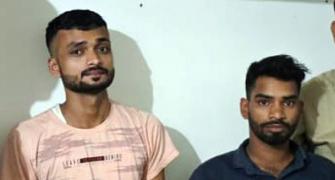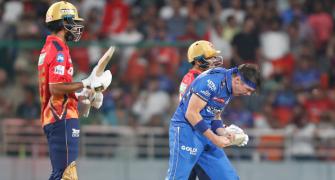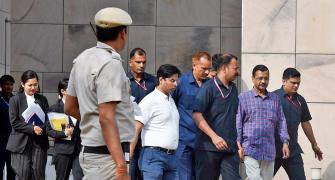The post-mortem on the United States-India Strategic Dialogue co-chaired by US Secretary of State Hillary Clinton and External Affairs Minister S M Krishna -- which also had the icing on the cake of President Barack Obama attending and delivering remarks at Clinton's reception for Krishna and the Indian delegation at the conclusion of the talks, where he pledged his unequivocal commitment to further US-India ties -- in the eyes of South Asia experts in Washington, DC, was mixed.
In interviews with rediff.com- -- these experts who monitored the dialogue and the other meetings on its sidelines -- said while they were heavy on symbolism and the atmospherics, particularly with Obama making the rare gesture of coming over to the State Department to participate in a reception for the Indian foreign minister and his delegation was high point, tangible deliverables were found wanting.
The consensus among them was also that notwithstanding the Obama administration going further ahead than any previous administration in saying that India would have to be an integral part of any reform of the United Nations Security Council, the reticence of a public endorsement of New Delhi bid for a permanent seat in the UNSC, showed that it was not willing to go to bat for India in this regard even though Britain and France have endorsed India's candidacy.
Ashley Tellis, senior associate at the Carnegie Endowment for International Peace and one of the country's foremost strategic experts, said, "This Strategic Dialogue began against the backdrop of great Indian pessimism about the Obama administration's commitment to deepening the US-Indian relationship."'
He acknowledged that "to the administration's credit, the White House and the State Department understood the challenge and responded vigorously," and pointed to "the successive statements, first by Under Secretary (Bill) Burns, then by Secretary Clinton, and finally by President Obama himself, who all affirmed three key propositions quite successfully in my view."
"That President Obama remains deeply and personally committed to sustaining the transformation of US-Indian relations; the United States under Obama remains committed to continuing President Bush's policy of aiding the rise of Indian power; and finally, India is a responsible power that will increasingly become central to global governance."
Thus, Tellis argued, "The Obama administration gave notice that it intended to contest those who were skeptical about the administration's intentions towards India."
"The real test, however," he said, "will come in the months ahead and during the President's visit to India; will this renewed commitment translate into tangible achievements of value to both sides?"
Tellis said that "on this count, the decisions made in Washington will be just as important as the choices made in New Delhi," and added: "It would indeed be a pity if the government of India were to flag just as the Obama administration begins to recommit to driving the relationship forward."
Deepa Ollapally, associate director, The Sigur Center for Asian Studies at George Washington University, said, "I have to wonder how far the US-India strategic dialogue will really go in dealing with security issues directly and immediately relevant to India -- terrorist threats and regional stability in South Asia."
She argued that "the US continues to be caught in the decades-old dilemma of feeling that it has no option but to rely on the Pakistan military for America's foreign policy objectives in Afghanistan, and in the process, allows Pakistan to have leverage over US relations with India."
"I think the Obama administration clearly sees the Pakistan military as an imperfect partner, but unless they can find an alternative or there is fundamental change with Pakistan, this dilemma can't be resolved," she said.
Meanwhile, Ollapally said, "If India's major security concerns have to be brushed under the carpet on a pretty regular basis, the value of the strategic dialogue is just not going to be that high from New Delhi's perspective. After all, real strategic relationships are forged through tangible cooperation on vital interests."
"I don't want to downgrade the importance of the strategic dialogue however since it still sends a powerful signal about US commitment to keeping relations with India on a clear upward trajectory," she said, and added: "There's a lot of value in that."
Ollapally said, "There is also a lot of potential to cooperate on other issues, but India and the US are probably going to have to leapfrog the regional problems to a great extent."
Lisa Curtis, who heads the South Asia Program at the conservative Heritage Foundation -- a Washington, DC-based think tank said, acknowledged that there was no denying that "the Obama administration clearly went out of its way to demonstrate that it values its partnership with India."
Curtis, an erstwhile CIA analyst and ex-Congressional staffer on the Senate Foreign Relations Committee, said that "after sending mixed signals to India about its role in the region, particularly in Afghanistan, over the last 18 months, the administration is finally showing that it has a long-term vision for US-India relations."
Thus, she said, "This visit represents a real turning point in the Obama administration policy toward India and we can now see a sharper, more focused India policy taking shape."
Curtis said that "US officials set the record straight regarding the US welcoming and appreciating India's role in Afghanistan. Despite Pakistani lobbying, it seems the administration will not ask India to draw down its presence in Afghanistan as had been hinted earlier from US military circles."
She pointed out that the US-India Strategic Dialogue tool place "on the heels of the recently released National Security Strategy, which also helped clarify how the Obama administration factors India into its foreign policy agenda -- India was singled out as a rising center of influence along with China and Russia and the NSS emphasised the importance of the US forging strategic relations with India.
Curtis said "the US and India likely did not see eye-to-eye on all issues, however. There are still concerns in India for example, about US views toward reconciliation with the Taliban. New Delhi fears that the US may be too eager to follow Pakistan's lead on the reconciliation issue, which would allow the Taliban a greater role in determining the future of Afghanistan."
Curtis also said that "the fact that Indian officials were finally given direct access to David Headley also removes a major irritant in the bilateral relationship."
With regard to the issue of an unequivocal and unambiguous support for India's bid for a permanent seat in the United Nations Security Council, Tellis said he believed that UN Security Council expansion was "not imminent by any means."
"For one thing, the administration's review is incomplete. Second, there is no consensus yet at the UN on what shape the UNSC reform must take."
But Tellis said, "The Obama administration statements, in my view, are slowly evolving reflections of the inevitable -- when UNSC reform occurs, India will become a permanent veto-wielding member."
"Any UNSC reform that does not have India as a full-fledged permanent member is absurd and meaningless," he said, and suggested, "What the administration should in fact do is transparently affirm its support for India's membership when the President visits India this November."
Tellis said, "The US gains most by supporting India for UNSC membership before it becomes inevitable, not after."
Ollapally was of the opinion that "the successful US-India nuclear deal may have driven home to New Delhi the idea that nothing is out of the realm of possibility."
She said the Indian 'exception' in particular seems to have given Indian policymakers a new confidence, and they are pressing India's current international advantage and making a concerted effort to get a seat on the Security Council."
But Ollapally argued that "to get the job done, India needs unambiguous support from the US, without which New Delhi's efforts are going to be pretty much frustrated. And despite all the recent declarations by the senior Obama officials and President Obama himself on the need for a greater global role for India, we haven't seen unqualified support for India's bid."
She said that she did not believe that "the American reluctance has to do only with China's objections to India's inclusion as a veto wielding member. After all, the US has come out in favour of Japan's claim to permanent membership, despite serious reservations from China and some of the other Asian neighbours."
"Rather, I think the US is still somewhat wary about India's international agenda and just how closely it will mirror US preferences," she said, and added: "So it's really a question of power sharing in the international system which the US is simply going to have to come to terms with -- sooner or later."
Ollapally said that in terms of India's position, "it's going to be harder and harder for the US to keep stalling. And I expect that India will keep pushing the envelope, since it really has nothing to lose."
She said that "in contrast to the bid in the mid-1990s, India is in a much stronger position to make its case, so there's no reason to back off."
Ollapally also pointed out "three of the five permanent members -- France, Russia and Britain -- have already supported India's inclusion."
Curtis acknowledged that the Obama administration "did take a more forward-leaning position on the question of India's potential to become part of a reformed United Nations Security Council."
But she said that "this does not mean that we are any closer to reform of the UNSC, however. It seemly means that US officials are more comfortable acknowledging India as a potential candidate."







